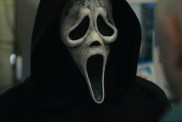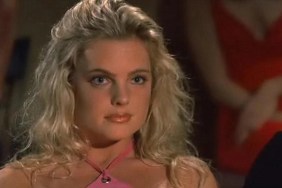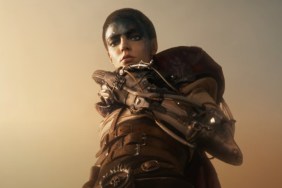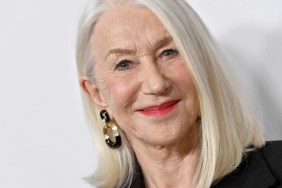
Locke is not a film the average moviegoer is going to glom onto. I’m certain the most common complaint will be, “Nothing happens”. Admittedly, if your idea of “something” is explosions, fist fights and gunfire then no, “nothing” happens. However, if the idea of watching a powerhouse performance from within a film offering a wholly unique perspective is of interest to you then maybe Locke is for you.
If watching a man struggle to hold his life together while doing what he believes to be the right thing is something you think will strike an emotional chord then Locke is most definitely for you.
If you haven’t heard by now, yes, Locke is an 85-minute film taking place entirely in one location. That location being within the car of its title character, Ivan Locke (Tom Hardy), as he drives from Birmingham to London for reasons I won’t divulge here.
As the film opens, Ivan must choose whether to go right or go left as he stops at a traffic light. Left is home to his wife (Ruth Wilson) and two sons (Tom Holland and Bill Milner), preparing sausages and cold beer for the night’s soccer match. Right is an undetermined future where he’ll be risking everything he holds dear, his family, job… everything.
Lights from a large truck are blinding in his rearview mirror. The streetlight turns green. Ivan doesn’t move his car an inch. The truck sounds its horn and, after a beat, Ivan switches his signal to turn right, toward miles of road, several phone calls, tears and personal torment.
Fielding a series of work-related and personal phone calls, Ivan is up for a whirlwind he couldn’t have prepared for and it’s on the shoulders of Tom Hardy and the script from writer/director Steven Knight (Eastern Promises) to make sure the audience remains invested and doesn’t tire from a scenario that could very easily fade from uniquely fascinating to stale and worn. It’s a balancing act that requires a lot of risk and faith in the project, and it’s carried out in masterful strokes.
As the phone continues to ring, Ivan must deal with an irate boss (Ben Daniels) — saved in his caller ID as “Bastard” — and a faithful underling played by Andrew Scott, though I would have sworn it was Chris O’Dowd, which should give you some idea just how exactly the character is played.
The phone continues to ring and Ivan continues to make calls as the intensity of the situation mounts. I must admit, there was a point I began to wonder how this was going to remain compelling. After all, how many times can we hear from the same people? Can a film sustain endless phone calls for 85 minutes? The answer, is yes.
The simplest solution proves the most valuable. While Ivan can only handle one phone call at a time, Knight has moments where he misses calls — “You have a call on the other line” chimes in the automated female voice as he misses one call after another — suddenly shifting your perspective from “How many calls is this guy going to take?” to “Oh damn, who was that on the other line? What did they want? What did Ivan miss?” Again, it’s not always what we know in a movie, but what we don’t know that compels us to become more involved.
The chief contribution, however, comes from Tom Hardy. Hardy’s performance is superb, playing a man whose demeanor suggests he’s a perfectionist at work, loving husband and wonderful father. You get the impression he can keep his cool under pressure, allows himself brief outbursts of anger, but only when alone, maintaining his professional appearance.
All this comes across in a performance Hardy must pull off from the driver’s seat of his BMW. It’s amazing, but almost certainly the immediacy of shooting the film live, recording the actors on both ends of the phone as Hardy drove down the M25 helped. The fact it was all captured in a matter of eight days, only six with Hardy, speaks to the fact you don’t need millions of dollars, massive sets and barrels of gunpowder to make a wonderful film. You just need to be willing and dedicated to making one.
To his credit, Knight never overshadows the performance. He knows where the focus must remain, but he and cinematographer Haris Zambarloukos (Jack Ryan: Shadow Recruit) do play with the streetlights and reflections as much as possible. They also test us and our opinions on Ivan’s psychological state in how a few of Ivan’s “conversations” are captured, but to say more would ruin the chance of you coming to your own conclusions.
On top of this being a film that won’t appeal to your average moviegoer, it’s also not a film that will appeal to those in need of some sort of absolute finality. It doesn’t come to any ultimate conclusions, nor should it. This is a very brief look into a man’s life, a life lived for many years already and with many years to come. There is no conclusion to this scenario that could ever satisfy one side of the audience or the other. The only satisfying conclusion would be to revisit the character ten years from now in the same way Richard Linklater returned to Celine and Jesse in the Before trilogy of films.
The mere fact Knight and Hardy were able to draw us in to such a major degree in 85 lightning fast minutes is a testament to the film’s power and if you’re upset at the end because you don’t get some ultimate finale, then the film worked for you as well. That anger you feel is not due to it being a bad film, but a film that held you by the heart and was unwilling to give you the happy ending you would have wanted. Let your imagination go and you decide where it all goes from there… what conclusion do you come to? The mystery of cinema doesn’t always work in the most obvious ways, sometimes you must decide the ultimate path for yourself.









